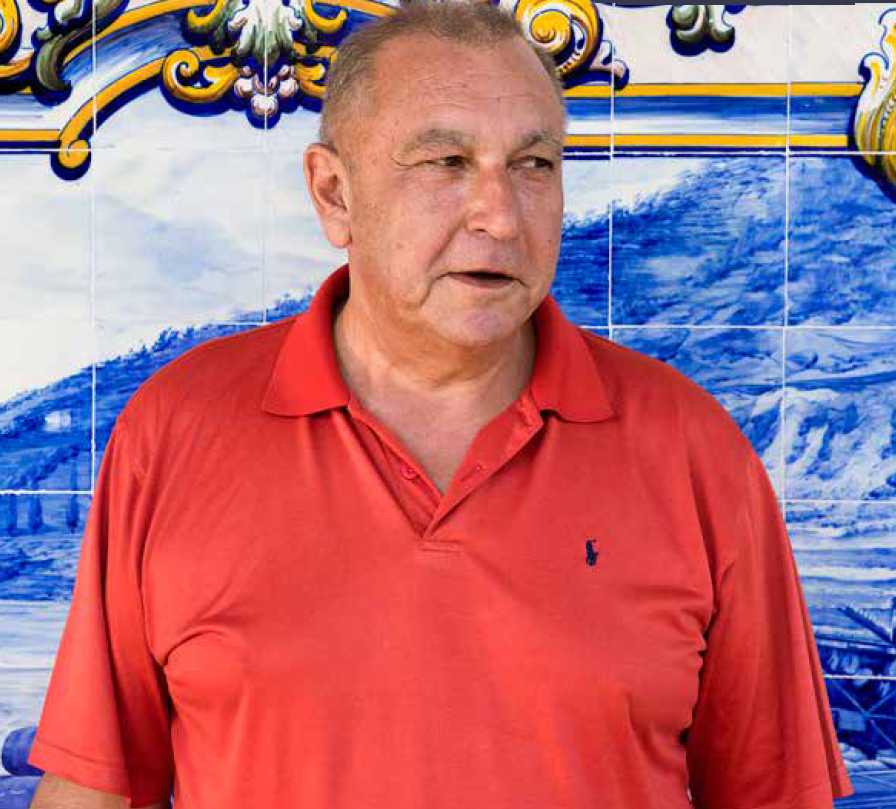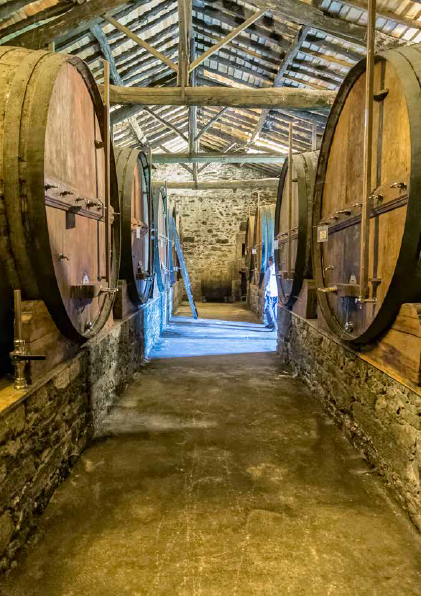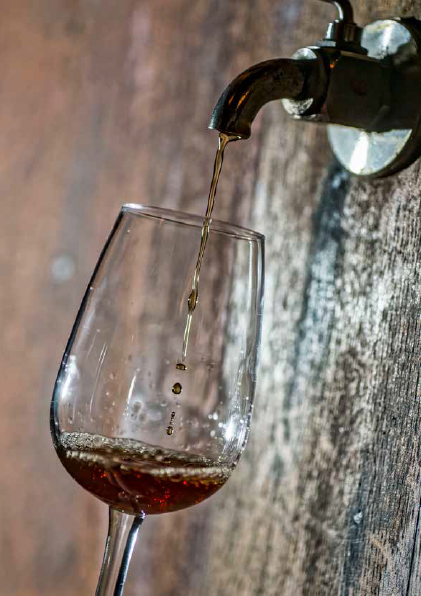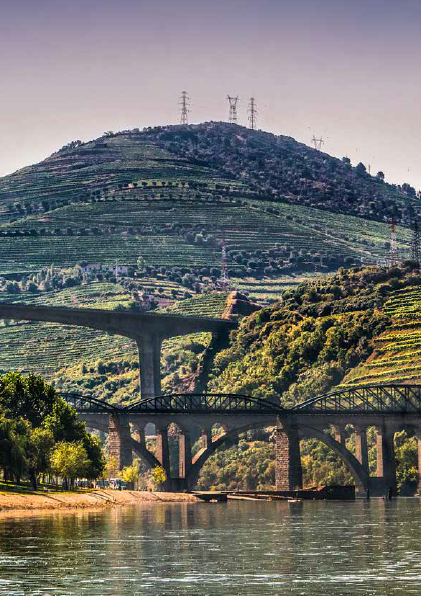Roland Heelen - Portal d'Azenha
The Douro Valley is one of Portugal’s most beautiful wine regions – a
fact known to the Flemish Roland Heelen when he first settled here in
the 1980s. His moving here marked the beginning of a great wine-growing
adventure, and Portal d’Azenha has now grown to become one of
the valley’s highest- quality wineries. And it is not without a certain pride
that Roland Heelen refers to himself as the only Belgian making port
wine. Portal d’Azenha now has a firm place on Portugal’s wine map. Yet
it was quite by chance that Roland Heelen ended up in Portugal. ‘I was
working as head of purchasing for a large beverage company and they
sent me to Portugal to work there in the 1980s. I soon met up with a
few Portuguese enthusiasts and started making port wine with one of
them, just for fun.
Slowly but surely I grew to love the country, its cheerful and hospitable
people, the mild climate. “I started out with a two-hectare vineyard, basically
just for pleasure. Every year we expanded a bit, until Portal
d’Azenha grew to 60 hectares, its current size.”
The Portal d’Azenha wines come from the Douro Valley, an 80 kilometre
long and 45 kilometre wide region surrounding the River Douro. The
valley is one of Portugal’s most beautiful regions – and not by chance a
Unesco World Heritage site. The high slate content of the soil makes it
possible to produce fantastic mineral wines in the Douro Valley. Though
production volumes are low on account of the relatively poor soil, this
is offset by the quality of the grapes.
The stony soil has one big advantage: in daytime the stones store the
heat, meaning that the soil does not cool out too much at night and the
temperature remains fairly constant.


Just like
Burgundy
Roland Heelen likes to compare ‘his’ terroir with that of Burgundy in
France, a region renowned for its favourable soil. ‘Proof of this comes
from the fact that, at blind tastings featuring the best Burgundy white
wines, Portal d’Azenha wines do exceptionally well time and time again.’
Alongside the good terroir, the vineyards lining the sides of the Douro
Valley enjoy an outstanding location.
The best vineyards are the higher ones, benefiting from the mild sea climate.
The wind can circulate freely for most of the year, providing good
ventilation for the vines. Mould and other diseases are thus virtually unknown.
‘We hardly have to spray at all, meaning that we basically run
the vineyard organically.’ Lining the banks of the Douro, the vineyards
enjoy abundant sunlight the whole day.
Finally, the terraced, often high and steep vineyards only allow manual
harvesting. This means that a selection of the grapes can already
be done in the vineyard, again benefiting quality. All grapes picked by
hand at Portal d’Azenha are collected in small 20 kg boxes.
These are top-quality grapes that have benefited the whole year long
from the best that the region can offer. Robert Heelen has known for
long that the Douro Valley has everything needed to produce a superior
quality wine.
Douro Valley wines are currently sold under the label ‘Denominação
the Origem Controlada’, or what could be called the ‘Appellation Douro’.
8
Outstanding
Port Wine
A WIDE VARIETY OF GRAPES
Portal d’Azenha is synonymous with wines
bearing the label Reserva and Grande Reserva.
In addition there is also the DOC white
wine and rosé. Most Douro wines are made
from different cépages, making the choice
particularly large. ‘Portugal has a large selection
– more than sixty – of good-tasting
native grape varieties. Why should we go
looking elsewhere when we have so many
to choose from on our doorstep?’
Even in a plot planted with just one particular
variety there can be differences in taste
and ripeness. The sides of the Douro Valley
are particularly steep, meaning that there
are often great differences of altitude within
vineyards. In the higher plots, it is somewhat
cooler, while in the lower plots, closer
to the river, the average temperature is often
somewhat higher. ‘This provides diversity
in the vineyard and in the qualityof the
grapes. And it’s this diversity which makes
wine-making so much more exciting.’ The
different cépages are harvested separately
at Portal d’Azenha. They are also stored
separately before being vinified and blended.
Each variety has its own character, its
own taste and its own ripening point. ‘Separate
vinification is the best guarantee for a
top wine. Our aim is to be able to taste the
authenticity and character of an individual
cépage in the glass.’
Even the choice of the wooden barrels is
made on the basis of the grape variety.
While Portal d’Azenha ages solely in French
barrels, these can come from different places
in France and be made by different tonneliers.
OUTSTANDING PORT WINE
Portal d’Azenha is known not just for its
white and red wine, but also for its port
wine. To make it, Roland Heelen is helped
by another Portuguese expert: Miguel Braga,
the owner of Quinta do Mourão where
Roland makes his port wine. Port remains
one of the Douro Valley’s main export products,
and some 38,000 hectares of vineyards
are devoted to the production of port
(compared to the 45,000 hectares used for
making red and white wine). The Douro Valley
is today the home of about one hundred
port producers. Roland has reason to be
proud, being the world’s only Belgian port
maker. He allows us to taste a 100 year-old
port, tapped from one of the large oak barrels,
in which port wine spends many years
‘maturing’ at a constant temperature, producing
a complex, perfectly-balanced port
wine. ‘When making port wine, it is very
important to get the right balance. A good
tawny port should have the right balance
between sweet, sour and alcohol.


Unknown is unloved
Despite everything, the Douro Valley remains a lesser-known wine region,
and just ten years ago it was practically off the map. But things
have changed greatly since then, and the region has become a lot more
accessible due inter alia to a lot of road improvements.
But also because more and more connoisseurs are beginning to appreciate
the quality of the wines made here. You often forget that wine has
been produced here for at least two thousand years. And on top of that,
the Douro Valley was the world’s first officially recognized wine-producing
region. In 1757 the Marquis de Pombal decreed that the Douro Valley
vineyards were to be demarcated by solid granite piles on the ground,
thereby creating the world’s first controlled production region in 1758.
He also set down the first production rules for the Região Demarcada de
Douro. But this was no immediate guarantee that the name would gain
quick recognition abroad. In fact the whole wine-making business was
in the exclusive hands of the English for a long time, with old English
noble families buying up the majority of vineyards two hundred years
ago. It wasn’t until 1982 that the region was able to free itself from this
monopoly. Nevertheless, a lot still reminds us of that time, with 70%
of today’s production still in English hands. This didn’t make it easier
for a (modest) Flemish winegrower – Roland Heelen – to gain a foothold
here. ‘You can just imagine the eyebrows raised when a Fleming
succeeded in producing good products … In that sense I sympathize
with the native Portuguese who over the years were always eclipsed by
the English. I’ve always sided with the Portuguese, and that’s the way
things are going to stay.’
These days, Portuguese wines are far from being eclipsed, as seen in
the list of the world’s best wines published in the Wine Spectator in late
2014: three of the four wines topping the list came from Portugal,
and more specifically from the Douro Valley!
A Strong Team
In his winery, Roland Heelen is surrounded by experts. These include
Jean-Claude Cretu, a French-Portuguese oenologist who has been working
for Roland for years; Eric Nurmi, a Californian oenologist who has also
been associated with Portal d’Azenha for several years, and José Alves,
a Portuguese oenologist and winemaker with whom Roland now cooperates.
José is the owner of Quinta da Rede, where not only the grapes
from his own vineyards are pressed, but also the best ones from the Portal
d’Azenha harvest.
Roland Heelen is the manager of Portal d’Azenha, but all the work in the
winery is subcontracted. Teamwork is key to top quality, but also makes
economic sense. ‘Through resorting to subcontractors, I save money and
can remain competitive. Totalling 60 hectares in size, some of the vineyards
are owned by Roland, others leased. Despite being relatively young,
Portal d’Azenha can already look back on a great past as a winery. ‘For me,
making money is not the main thing. It’s the passion that counts.’
There is currently a question mark over the winery’s future. Roland Heelen
has two grown-up sons, but they are at present not interested in following
in their father’s footsteps. But whatever happens, with a person like
Roland Heelen at the helm, the future of Portal d’Azenha is guaranteed.
His ambitions? ‘To make sure that Portal d’Azenha ends up in good hands.
And to spend more time playing golf or cooking, things that I love doing.’





